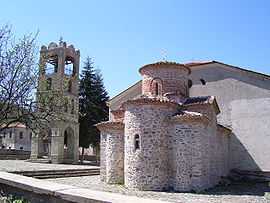Agios Germanos
| Agios Germanos Άγιος Γερμανός | |
|---|---|
|
Agios Germanos church | |
 Agios Germanos | |
|
Location within the region | |
| Coordinates: 40°50.18′N 21°09.32′E / 40.83633°N 21.15533°ECoordinates: 40°50.18′N 21°09.32′E / 40.83633°N 21.15533°E | |
| Country | Greece |
| Administrative region | West Macedonia |
| Regional unit | Florina |
| Municipality | Prespes |
| Municipal unit | Prespes |
| Population (2001)[1] | |
| • Rural | 231 |
| Time zone | EET (UTC+2) |
| • Summer (DST) | EEST (UTC+3) |
Agios Germanos, (Greek: Άγιος Γερμανός, meaning Saint Germanus; Macedonian Slavic Герман, German) is a village in the Prespes Municipality in West Macedonia, Greece. Agios Germanos is located at an altitude of approximately 1,100 meters (3,606 feet), on a hillside, part of the Varnoundas Mountains. It is 7 kilometers (4.3 mi) from the Prespes lakes, which can be seen from a panorama location of the village. Agios Germanos lies 45 km (28 mi) from Florina, and 44 km (27 mi) from Kastoria.
Features
The village is the only village in the Prespes region that has preserved all of the old stone houses. The Byzantine church that forms the nucleus of the present village dates to the beginning of the 11th century. It has very interesting frescos painted in three different phases. Nearby, the church of Agios Athanasios was built at the end of the 18th century.
The village is especially known among tourists for hiking, bird watching and the Agios Germanos river with falls, which has the endangered species of the Salmo trutta peristericus trout. Agios Germanos river is on the northeast of the village. One can also see the restored water mills along the river.
Following the paths, one can reach the impressive mixed fir-beech forests,and the summits of Kitsevo or Despotiko (2,177m). The Sarakatsani, nomadic shepherds from Thessaly, have the tradition of bringing their herds to graze on these mountains every year from May to October.
Just north of the village is an early 20th-century church built by Steven Doinidis. This church is kept up by the villagers, who number just over 200 as of 2008.
Demographics
According to Bosnian ethnographer Stephan Verkovic, in 1889 the village had 213 households and a population of 1016 Bulgarians.[2] In 1905 the population had gone down to 1250 with 90 of them being Arnauts (Albanians) and the rest - Bulgarians.[3]
Today, the village has a mixed population of Macedonian-speaking Slavophones, Aromanians and Pontic Greeks.[4]
Gallery
-
Across Agios Germanos to the Prespes lakes
-
Agios Germanos with the Prespes lakes in the background
References
- ↑ De Facto Population of Greece Population and Housing Census of March 18th, 2001 (PDF 39 MB). National Statistical Service of Greece. 2003.
- ↑ Стефан Веркович. „Топографическо-этнографический очерк Македонии“. СПб, 1889. (Russian)
- ↑ D.M.Brancoff. "La Macédoine et sa Population Chrétienne". Paris, 1905, р.170-17
- ↑ 10|2001: Villageois et citadins de Grèce, Identités, Mémoires, Représentations, Usage des langues minoritaires dans les départements de Florina et d’Aridea (Macédoine) Riki Van, Boeschoten.
External links
| ||||||||||


